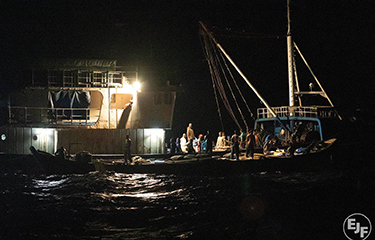Despite having a record of weak enforcement of its regulations against illegal fishing, Ghana has for the first time in nearly five years apprehended a trawler manned by Chinese and Ghanaian crew with an estimated 13.9 metric tons of illegal small pelagic fish caught in a single day, according to a press statement by the Environmental Justice Foundation (EJF).
The trawler, which has been fined USD 1 million (EUR 896,661), was found using illegal nets that have been blamed for the destruction of pelagic fish habitats, denying small fishers an opportunity to catch fish with their local canoes.
“The use of the full USD 1 million [EUR 896,661] fine is a welcome sign that the government is cracking down on the illegal and destructive practices of industrial trawlers,” EJF said in a statement.
This is the first time a minimum fine of USD 1 million – provided for in the 2014 Fisheries Amendment Act – has been slapped on a trawler caught engaging in illegal fishing in Ghana, even though the country is replete with instances of out-of-court settlements.
EJF has called for full payment of the fine to deter similar illegal fishing incidents in Ghana, although it said there is concern that in the past, “fines have been negotiated down or opaque out-of-court settlements have obscured whether the law has been enforced.”
EJF noted that small pelagic fish populations in Ghana such as the sardinella, which is the mainstay of the country’s fishing community, “have crashed over the past two decades, threatening the livelihoods of canoe fishers and the food security of coastal communities.”
Ghana’s illegal saiko trade – which entails commercial trawlers sneaking into inshore exclusive fishing zones to catch small pelagic species, that are then disguised as bycatch for freezing and unloaded to specially modified canoes – has been blamed for the country’s imminent collapse of its fisheries sector.
The saiko trade, involving fish sold at sea, was valued at USD 40.6 million to 50.7 million (EUR 36.4 to 45.4 million) in 2017, with another USD 52.7 million to 81.1 million (EUR 47.2 to 72.7 million) estimated to have been sold at landing sites, according to EJF.
EJF says 90 percent of Ghana’s industrial fishing fleet is linked to Chinese ownership, some which are owned by foreigners fronting local companies and “using opaque corporate structures to import their vessels and register and obtain a license.”
Meanwhile, Ghana, which reported 450,000 metric tons in total domestic fish production in the past five years, is likely to scale up these volumes through fish farming, “as marine stocks approach critical levels due to overfishing.”
Although the country’s recent tuna production and exports posted positive growth, “the overall production trend for capture fisheries is static, if not declining," according to a USDA Foreign Agriculture Service report.
The diminishing marine capture is expected to force up Ghana’s seafood and fish products imports. The amount of seafood imported by Ghana reached USD 311 million (EUR 278.8 million) in 2018.
Photo courtesy of the Environmental Justice Foundation







